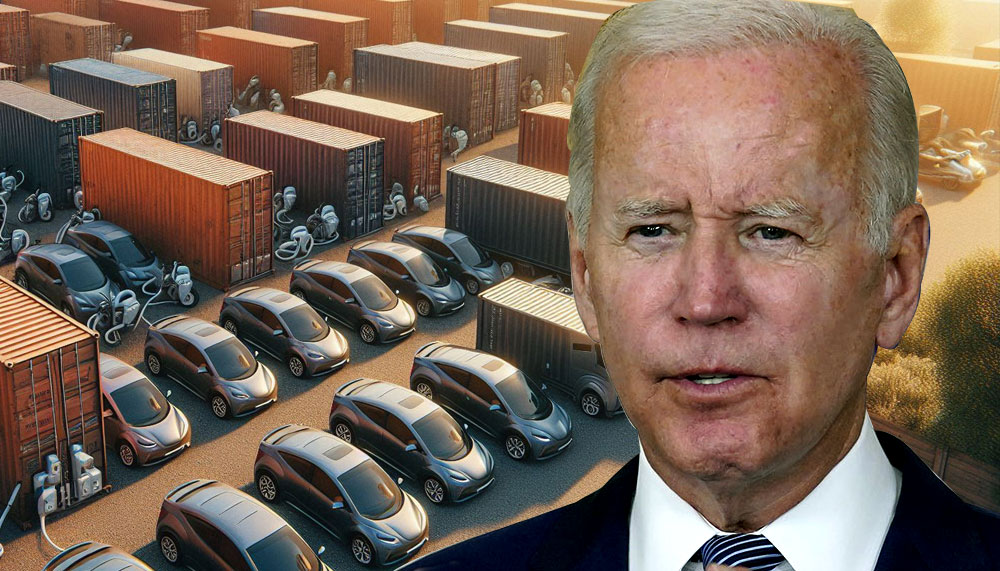Highlights
- The Biden administration has announced a 100% tariff on Chinese electric vehicles (EVs) and other imports, effective immediately.
- The move is aimed at protecting U.S. workers and companies in strategic sectors and punishing China for unfair trade practices.
- China has expressed “strong dissatisfaction” with the decision, warning of retaliation and harm to bilateral cooperation.
The Biden administration has imposed a 100% tariff on Chinese electric vehicles (EVs), semiconductors, and medical products, among other imports. The move is intended to protect U.S. workers and companies in strategic sectors and punish China for unfair trade practices.
U.S. Seeks to Level Playing Field for Domestic Industries
The tariff hike is part of the Biden administration’s efforts to level the playing field for domestic industries and promote fair trade practices. The administration has accused China of heavily subsidizing its EV industry, leading to prices so low that American manufacturers could be “crushed” by the competition.
China Expresses Strong Dissatisfaction and Warns of Retaliation
China’s commerce ministry has expressed “strong dissatisfaction” with the decision, saying it violates Biden’s promises not to suppress China’s development and will harm bilateral cooperation. China has warned of retaliation and urged the U.S. to “immediately correct its wrong practices” and cancel the tariff measures.
Tariff Hike Seen as Political Gesture Ahead of Election
The move is seen as a political gesture ahead of the presidential election, where trade and jobs will be a key issue. The Biden administration has tried to distinguish its strategy from Trump’s approach, calling it a “smarter approach” that targets specific industries rather than broad tariffs on all imported goods.
New tariffs – at a glance
- semiconductors – from 25% to 50% by 2025
- certain steel and aluminium products – from 7.5% to 25% in 2024
- electric vehicles – from 25% to 100% in 2024
- lithium batteries and critical minerals – from 7.5% to 25% in 2024
- solar cells – from 25% to 50% in 2024
- ship to shore cranes – from 0% to 25% in 2024
- rubber medical and surgical gloves – from 7.5% to 25% in 2026
U.S.-China Trade Relations at a Crossroads
The tariff hike has raised concerns about the future of U.S.-China trade relations. The White House has downplayed the risk of retaliation, but China’s warning of “resolute measures” to defend its rights and interests has raised the stakes. The move has also sparked concerns about the impact on global trade and the economy.
New Tariffs to Affect $18 Billion of Chinese Imports
The new tariffs will affect $18 billion of Chinese imports, including EVs, semiconductors, and medical products. The tariffs will also apply to certain steel and aluminum products, as well as lithium-ion batteries and critical minerals.
Biden Administration Keeps Trump-Era Tariffs in Place
The Biden administration has decided to keep the Trump-era tariffs on more than $300 billion of Chinese imports in place. The move is seen as a sign of continuity in the U.S. trade policy towards China.
U.S. Trade Representative Defends Tariff Hike
U.S. Trade Representative Katherine Tai has defended the tariff hike, saying it is necessary to protect U.S. industries and workers from unfair Chinese trade practices. Tai has also emphasized the need for a “smarter approach” to trade policy, one that targets specific industries and practices rather than broad tariffs on all imported goods.
China Warns of Retaliation and Harm to Bilateral Cooperation
China’s commerce ministry has warned that the tariff hike will “seriously affect the atmosphere around bilateral cooperation” and has urged the U.S. to “immediately correct its wrong practices” and cancel the tariff measures. China has also expressed its “strong dissatisfaction” with the decision and has vowed to take “resolute measures” to defend its rights and interests.
More on VOU
The Persistence of Unhealthy Diets in the United States: An Examination
Highlights The State of American Diets Recent research from Tufts University, published in the Annals of…
Here’s Why Refined Sugar is a Slow Poison According to Nutritionists
Highlights White sugar, also known as refined sugar, is a staple in many diets worldwide. While…
ByteDance Teams Up with Broadcom and TSMC to Develop 5nm AI Chip
Highlights: ByteDance’s Strategic Move in AI Chip Development TikTok’s parent company, ByteDance, has embarked on a…
Apple and Meta Eyeing AI Partnership
Highlights Apple and Meta’s AI Vision Apple is reportedly in talks with Meta to explore a…





